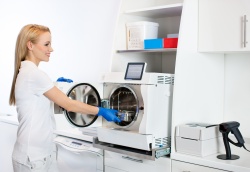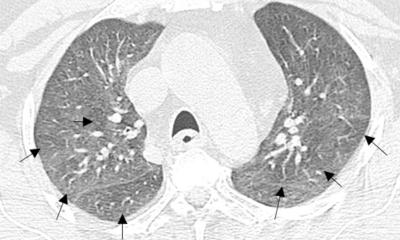Hygiene standards
A case for better safety guidelines
In recent years a number of hygiene incidents concerning medical practices or hospitals have worried patients across Europe. However, every incident has become a learning experience and heightened awareness of the importance of thorough hygiene.

Henry Schein, the world’s largest provider of healthcare products and services to more than one million dental, medical and animal health practitioners, is No 1 on FORTUNE‘s list of the World’s Most Admired Companies in healthcare (wholesalers category). The company offers integrated consulting for efficient medical practice management, with hygiene among the focus topics. A unified hygiene standard, however, is by no means easy to achieve, as illustrated during a discussion, with Markus Bappert, Regional Director for Austria and Eastern Europe, Otto Wiechert, Sales Manager for Germany for Hygiene and QM, and Juan Molina, Managing Director of Henry Schein in Spain and Portugal, to take a comparative look at Spain, Austria and Germany.
Focusing on the importance of hygiene and infection prevention:
Bappert: ‘In Europe you have to look at each country individually. As far as Henry Schein is concerned, hygiene is very important – in any country. Since there are different standards in different countries, implementation of a unified standard is a major issue. Due to extensive media coverage, and attention the issue receives from patients, hygiene and everything related to it have gained importance.’
Wiechert: ‘We increasingly notice that medical practices are using hygiene as a marketing tool to underscore the quality of their facilities. It’s cool to portray one‘s practice as “green” and as hygiene-conscious. Before, hygiene measures were more or less considered a burden, something imposed by the regulator in order to protect patients and staff. This view is changing as patients themselves are becoming aware of the issue.’
Molina: ‘In Spain, the issue of hygiene is as important as in any other country. As a company we consider it our task to increase awareness and knowledge of hygiene issues along the entire healthcare economy chain, since studies have shown that healthcare-associated infections in Spain cost 700 million euros each year – that’s one million euros per larger hospital.’
To what extent do hygiene standards differ between one country and another?
Bappert: ‘In Austria there is a guideline published by the Austrian Society of Hygiene in Dentistry, the ÖGHZ. However, this guideline cannot be compared with a law as it exists for example in Germany, and it’s not as strict as a law, meaning the guidelines do not prescribe the products the physician has to invest in to establish a certain hygiene standard. Much is happening right now. Last summer we initiated a round table with leading experts and we launched an initiative that aims to put the spotlight on hygiene. In this context, ÖGHZ and Schein jointly organised a series of events that drew more than 1,200 participants. ‘This led to several companies expressing a strong interest in cooperating with us as well as supporting us with their expert hygiene knowledge.’
Wiechert: ‘In Germany, the situation is somewhat more complex. Whilst there is a national law, implementation and standards differ in the individual German federal states. A multitude of government agencies audit medical practices, such as the healthcare authority, the trade inspection authority and regional government, with the latter sometimes “outsourcing” the audit to the German Medical Association, or the Regional Dental Chamber. In short: there is no unified national standard. As far as implementation is concerned this means that each agency or authority which audits a practice has a different focus. ‘Moreover the term “consultant” is unfortunately not a protected designation and consultants indeed apply different approaches to the implementation of hygiene measures. Consequently, a professional training event, such as the series that was organised in Austria, might make little sense on a national level in Germany; a presentation given in North Rhine Westphalia might not be valid in a different federal state.’
Molina: ‘In Spain, there are currently different initiatives, some launched by the government, others by professional associations. The most important one is arguably an initiative by the Spanish Federation of Health Technology Companies, which aims to reduce the number of healthcare-associated infections by 30 percent by the year 2020. ‘We do have to raise awareness on all aspects of hygiene and infections in all healthcare facilities and we need to establish a hygiene control system and quality audit. Moreover, we need constant monitoring of all hygiene and disinfection measures in all facilities in order to effectively prevent infections.’
Should European countries all establish unified standards and require medical practices to use certain products?
Bappert: ‘Whilst indeed there are hygiene and non-hygiene products and systems, it’s not the products that are crucial, but the processes. On the one hand you can create sterility without equipment, using a manual procedure; the equipment simply facilitates the task. On the other hand, if you have top of the line equipment but no adequate procedures, you do have a hygiene risk right there. Vice versa: simple equipment and the right process can be immensely effective in assuring superior hygiene without major capital investments.’
Wiechert: ‘In my opinion, it should be exactly the other way round: there should be a certain financial incentive for certain services that are to be guided by the health insurers. As the manager of a medical practice, for example, I’d have to obtain a “green light” label, which shows that I implemented certain measures – and only those practices that have obtained the label would be eligible for reimbursement by the health insurers. That would be the easiest approach for all parties concerned.’
Molina: ‘Spain has a very well developed network of public and private hospitals. We are currently working to make all facilities implement identical control mechanisms and protocols because we have to be even more effective in identifying potential problems with regard to hygiene and disinfection quality. This, as far as I am concerned, requires a unified quality assurance process and identical use of technology. A recently published European study indicated that, in Spain, the level of out-dated equipment is slightly above the European average. Therefore, I consider it very important for the decision makers in healthcare, and in government, to invest in adequate technology in order to ensure the required level of hygiene and infection prevention. One of Spain’s strengths is clearly the quality of our excellently trained physicians. They play a crucial role in the assessment of the hygiene situation and can initiate improvements. I’m convinced we need a balance between professional training and the quality of the technology we use. We need safety guidelines and concrete work instructions and we have to further improve communication with the patients.’
04.09.2015






